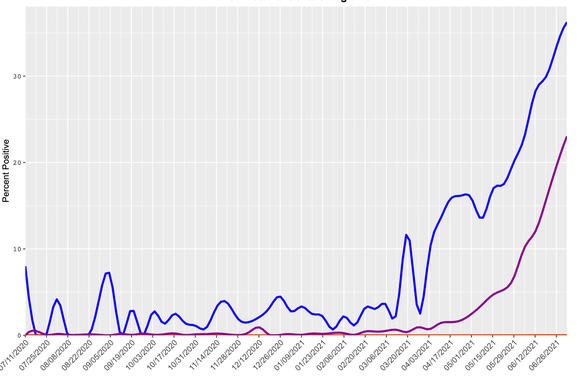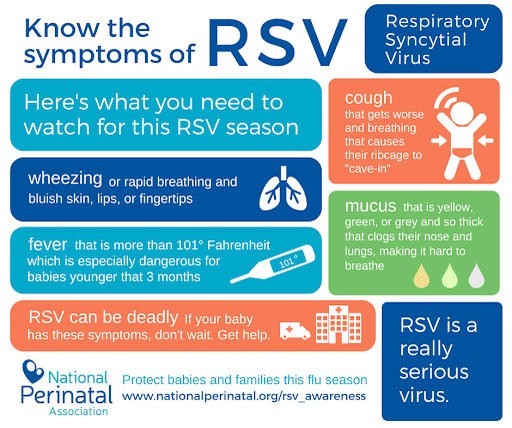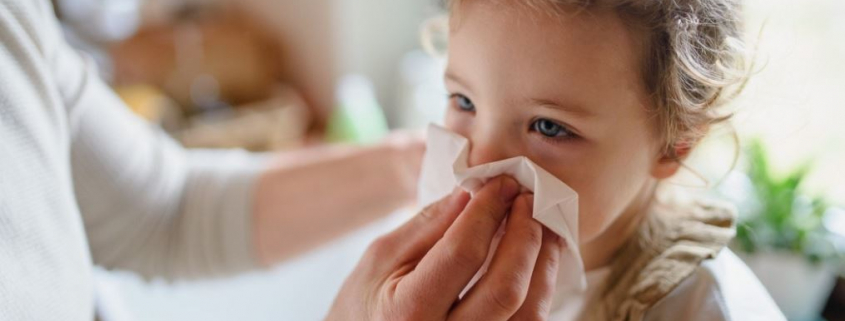The South is Seeing a Weird Rise in a Winter Virus This Summer Affecting Kids
RSV cases are popping up across North Texas, and we are not sure why it’s happening.
As Texas and the Southern Unites States reopens and things return to normal, winter viruses are making up for the lost time. North Texas is experiencing a rare summer rise in RSV cases in children.
The Dallas County Health Department released a health alert citing a surge in the identifications of Respiratory Syncytial Virus (RSV). RSV is a common respiratory virus that typically causes mild cold symptoms in a seasonal pattern. RSV usually spikes in the Fall and goes quiet in the Spring.
Scientists are not sure why North Texas is seeing an increase in RSV cases during the hot Texas Summer. The current theory is our increased social isolation during Covid-19 restrictions kept RSV suppressed during the Winter.
The Dallas and Fort Worth Health Departments have noted the rise in cases. The CDC issued an alert for the entire southern United States after spotting the same trend. Dallas County has asked health providers to test adults and children with viral symptoms with an RSV PCR test.
Dallas County also plans to track COVID-19 and RSV coinfection incidence to help prevent a broader outbreak.
Check out this chart showing the spike in RSV cases compared to one year ago. In most years, we would see a surge in the Winter. This year, RSV cases began to increase in late April. The caseload is on a rapid trajectory higher.

RSV Trends Southern United StatesChart CC Center for Disease Control and Prevention
Most people who come down with RSV experience mild flu-like symptoms, but RSV can cause serious illness in children under two years old. Premature babies and children with chronic heart or lung disease are more susceptible to severe complications caused by RSV.
When RSV progress, patients can develop pneumonia and require hospitalization.
The CDC tracks RSV data across the United States. Each year, RSV causes:
- 2.1 million outpatient visits among children younger than 5 years old
- 58,000 hospitalizations among children younger than 5 years old
- 177,000 hospitalizations among adults 65 years and older
- 14,000 deaths among adults 65 years and older
Like Covid-19, RSV is a respiratory virus. It is passed from person to person through respiratory droplets. Tiny amounts of the virus spread when someone coughs, laughs, or sneezes. We can take the lessons we learned from Covid-19 to reduce the risk of all respiratory infections.

Photo: Romrodinka Istock/Getty Images
We can slow transmission by avoiding going out when we are feeling sick. We can reduce contact with others who are ill. Parents should encourage children to frequently wash their hands with soap and water and practice good hand hygiene. Children and adults should avoid touching their faces or rubbing their eyes.
RSV can be transmitted when droplets contaminate surfaces and objects. Cleaning surfaces and disinfecting children’s toys also help reduce the spread of respiratory droplets.
The CDC has asked healthcare providers, childcare personnel, or elder-care workers with RSV symptoms to avoid going to work while ill.

Know the RSV symptoms.Infographic CC National Perinatal Association
RSV symptoms are tricky. Many symptoms are the same as the common cold. Common symptoms include:
- Runny nose
- Decrease in appetite
- Coughing
- Sneezing
- Fever
- Wheezing
In infants and newborns symptoms may include:
- Runny nose
- Cough
- Fussiness
- Poor feeding
- Fever > 100.4
Parents must know when RSV is circulating in a community, we must take these symptoms seriously. Prompt evaluation is needed for any child who is coughing, wheezing, or working hard to breathe.
Most RSV cases resolve on their own in about one week. There are no specific anti-viral medications or treatments for RSV. Several RSV vaccine clinical trial vaccines are in progress.
Parents can manage a child’s fever with over-the-counter such as acetaminophen or ibuprofen after evaluation by their doctor. Viral illness can cause dehydration so it is important to make sure children are drinking plenty of fluids.
Article originally published on Medika Life.
Blog Author: Dr. Jeff Livingston
Main Blog Photo By: Halfpoint Istock/Getty Images













